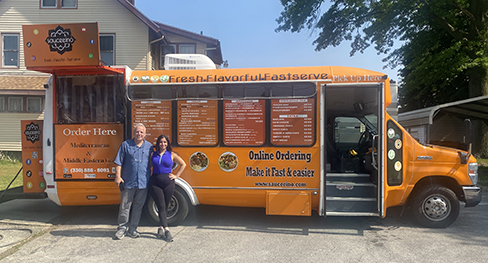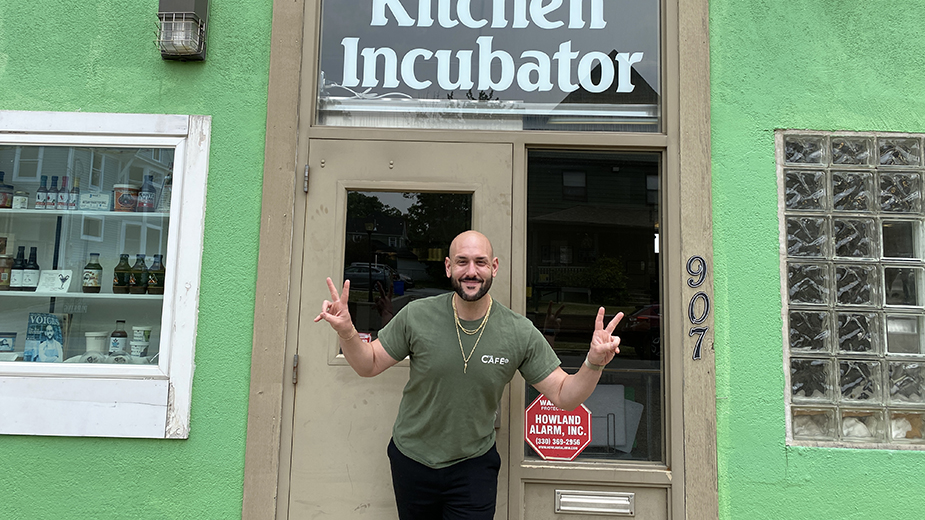YOUNGSTOWN, Ohio – The local food scene took a big hit during the pandemic with the restaurant shutdown, supply shortages, social distancing, and other restrictions. However, it’s slowly coming back with the help of kitchen incubators and other community resources.
Kitchen incubators are shared-use kitchens where food entrepreneurs prepare, cook and develop recipes while gaining business resources.
The Common Wealth Kitchen Incubator at 907 Elm St. in Youngstown, which has been around since 2009, serves as a launch pad for aspiring food entrepreneurs that allows them to create products without making a large investment in a restaurant.
Common Wealth’s kitchen manager, Gino West, says he’s always at the site, acting as a guide for newer entrepreneurs.
“There isn’t as much licensing necessary because we’re all under one roof. I guide [startup entrepreneurs] through a few essential steps,” West says. “I essentially jump through the hoops for you by sending links and resources and then I’m always in the kitchen.”
Entrepreneurs must meet several requirements before using the kitchen, such as obtaining food licenses, Food ServSafe certification and insurance.
In addition to legal obstacles, a large financial barrier must be overcome to enter the food market. Without kitchen incubators, individuals would have to acquire a licensed facility, whether that is a restaurant, their own commercial kitchen space or a mobile kitchen. The cost of these spaces vary but are substantial investments for someone looking to start a business who is likely short of capital.
The kitchen incubator acts as an affordable entry into the food market because it charges by the hour and has almost everything tenants could need, from pots and pans to commercial-grade ovens. Common Wealth charges $25 an hour.
“You use the kitchen as you need it,” West says. “A guy that runs a food truck needs a place like here to make his dough. He makes his dough, puts it in the freezer, then comes and picks it up the next day and he’s set for the week.”
The Common Wealth Kitchen Incubator is useful for almost anyone in the food business, according to West. “Youngstown is a foodie town. There are a lot of people that have their own food truck or BBQ sauce. [The kitchen] provides a space for them to make their product and it’s very beneficial for the area.”
SHARON food Incubator
The Laurel Technical Institute Sharon campus operates a commissary kitchen for its culinary students and community use.
The Laurel Kitchen Incubator is open to community members every evening and all day on weekends. It charges $25 for four hours and includes access to commercial-grade appliances and equipment.
The LTI kitchen commissary also hosts events for food entrepreneurs to sell their food to the public on the third Wednesday of every month.
P.J. O’Connor, a chef and the lead culinary instructor, says kitchen incubators aren’t common but are necessary.
“We do have so much great food here. But people just don’t have the money to open their own restaurant,” O’Connor says. “We have this opportunity [at kitchen incubators] to help startup businesses … and to keep the food ecosystem thriving.”
O’Connor says kitchen incubators allow individuals to pursue their passion in the food business instead of their business consuming them.
BRATWURST MAKER
Michael Blaurock uses the LTI kitchen to prepare and cook his signature bratwursts and other German foods before an event or for catering orders. He is the owner and founder of Blaurock Brats LLC.
This isn’t Blaurock’s first time in the food business. He owned a restaurant from 2006 to 2011 in Lake County before switching careers. It wasn’t until October when he read about the LTI kitchen incubator that he thought about getting back into the food business.
Blaurock was once again inspired to start his own food business.
This time he envisions something different.
“My original restaurant, I went all in. I got the [$200,000] loan and the leased space — all that good stuff,” Blaurock says.
“This time I thought, ‘I want to do this on a shoestring budget.’ I want to spend less than $1,000 to start up. And working with LTI, I can do that.”
Now that he doesn’t need to have his own physical location, Blaurock says he enjoys the food business more. He is looking to arrange a pop-up concession at local farmers markets and the night market in Hermitage, Pa.
By keeping things simple, the only risk is time, according to Blaurock, “I can utilize their kitchen a night before the event for four hours – and it costs me $25,” he says. “It’s a no-brainer for myself.”
The LTI incubator and Gannon University also have great resources for getting the legal side of his business set up, Blaurock says.
COMPANY LAUNCHPAD
Before Gino West became the kitchen manager at Common Wealth, he used it to expand his own business, Prepped Wellness.
West used to buy groceries and prepare a week’s worth of meals for individuals in their own homes. However, his business was growing to a point where he wasn’t able to keep up with the travel and demand. Through a friend he was made aware of the kitchen incubator and his business continued to grow.
“It really helped scale my business beyond what I believed was possible,” West says.
Because of West’s own positive experience with the kitchen incubator in scaling his business, he is now providing the opportunity for others. “Starting your own business is a lot,” he says. “It’s like your own baby. But I have the experience. I’m knowledgeable. And I’m here to help.”
The summer season gets pretty busy at the kitchen incubators, according to O’Connor and West. The warm weather opens opportunities for food truck operators, pop-up concessionaires, and graduation and wedding reception caterers. Incubators make it easy for those entrepreneurs to prepare food for such purposes.

Food trucks are popular in the Youngstown area and are a great way to get into the local food scene, West says.
They are another pathway that doesn’t require as large of an investment as a restaurant and can go directly to the community to sell food.
Food trucks can be found at farmers markets, fairs, the Youngstown Flea, breweries and wineries, and private events.
One Youngstown-based and family-owned food truck, Sauceeino’s Mobile Food Truck, serves Mediterranean and Middle Eastern style food with a variety of homemade sauces. The food truck comes with eight sauces – each one with a unique name, flavor and story.
All food is fresh from the market, prepared and cooked on the truck and is healthful. The menu also includes vegan and gluten-free options.
“Mediterranean food is a healthy food option for people,” says Johnny Bassil, owner of Sauceeino. “A lot of people don’t know about [Mediterranean food] but are used to food trucks selling hot dogs, fried food and junk foods. They don’t know about tabbouleh or grape leaves, which are vegan.”
Bassil also owns Sauceeino restaurant on Market Street in Boardman, which is currently closed for renovations. The truck allows him to continue operations.
“The plan right now is to familiarize the people with Sauceeino’s. So when they drive by they’ll see the restaurant and remember the events we’ve covered. We’re just a family-owned business so we’re taking it step by step. People love Sauceeino,” Joelene Bassil, one of Johnny’s daughters, says.
According to Johnny, the food truck is cheaper, convenient and profitable.
Common Wealth’s West says he’s seeing more stability in the food market in the wake of the pandemic and a new wave of entrepreneurs as well as some returning kitchen users.
“People are starting to drum up their businesses again,” West says. “I don’t think enough people know about [Common Wealth Kitchen Incubator] but this is the place for them to take their business to the next level.”
Pictured at top: Gino West manages the kitchen incubator and owns Prepped Wellness foods.
